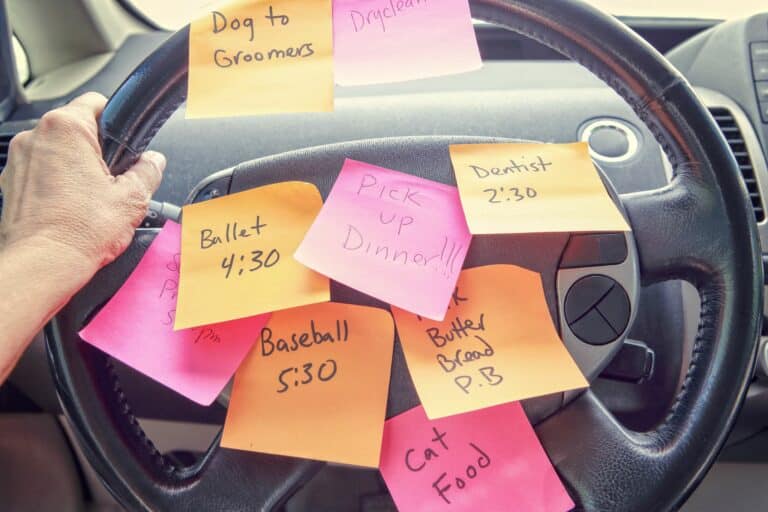Are you over-parenting and doing too much for your children?
Working parents often worry that we’re not doing ‘enough’ for our children. That we are working too much and parenting too little. Wracked with guilt that work is getting in the way, we feverishly dedicate our non-working hours to supporting our children to succeed. But, ironically, we can end up over-parenting and doing more than is good for our children.
With the best of intentions, we end up doing too much for them and – with too much on our plates – connecting too little with them.
What is over-parenting?
Working parents are especially prone to over-parenting because we so often carry guilt about not being available ‘enough’. We run around trying to make up for our absent hours by being superparents. We pick up their abandoned yoghurt pots (when the children could do it themselves). We pack their school bags (when they could pack them themselves). And we try to manage away all risk of failure and disappointment from their lives (and feel guilty when we can’t).
We send our stress levels sky-high by shouldering full responsibility for ensuring our children’s lives run smoothly (even well into their teenage years). And, when something falls through the cracks, we rush to the rescue, juggling work meetings with manic text messages to arrange someone to take our daughter’s forgotten lunch to school.
Why are we over-parenting?
Sometimes, this over-parenting stems from a thinking trap. From the belief that loving children unconditionally means having no boundaries around what we do for them. I’d do anything for my kids. Thinking that we demonstrate the extent of our love for our children by doing as much as possible for them.
Sometimes over-parenting springs from a belief that the reason we are exhausting ourselves at work all day is to create a good life for our kids. And that a good life doesn’t involve failure or disappointments for our children (it does).
Sometimes, adults use parenting as a crutch to shore up our own fragile self-esteem, trying as hard as we can to parent as well as we can so that we feel needed and worthwhile.
And sometimes, we just get stuck in perpetual work-mode and see our children as a project that reflects on our own competence. (Look at me, I’m doing so much, so well! My child never forgets her PE KIT or homework and wears fabulous costumes on World Book Day! Look, I’m so involved!).
And sometimes parents are just scared. We want to eliminate all risks from our children’s lives because the thought of something hurting them is just too awful to bear.
Doing too much is bad for parents
Modern working parents have written ourselves an impossible job description. It’s called ‘doing it all’. And we have been upsold this extra load with the lie that by ‘doing it all’ we will end up ‘having it all’. But what have we really got? Too much to remember, too much to feel responsible for, and too much to do. It’s hardly surprising that we are buckling under that mental load and grinding ourselves into a state of exhaustion. And we still feeling like we are failing!
Over-parenting is bad for children
Doing too much for our children risks not only stretching ourselves beyond what is humanly possible, it negatively impacts on children’s opportunities to develop good self-esteem. Having someone else who does everything for them deprives children of precious opportunities to build self-esteem. Having someone who makes sure they don’t make mistakes (and who steps in and makes it all better when they do) renders children powerless rather than making them feel effective. Over-parenting sends children the message “I think you can’t do it, that’s why I’m doing it”.
And rather than mistakes being seen as part of learning, over-parenting sends the signal that failure is to be avoided at all costs, engendering a fear of failure that can push children to perfectionism. Or just to stop trying altogether. By removing obstacles from children’s paths to spare them uncomfortable feelings, what we are really saying is “I don’t think you are strong enough to cope.”
And when parents are so busy holding everything together and picking up all the rubbish and managing that enormous To Do list, there’s not enough time left over for those precious moment. When your daughter just wants to have a lazy cuddle in your lap.
Do less, expect more
Every single skill children master, every tiny obstacle they overcome, contributes to building their self-esteem. Good self-esteem is built on children believing “I can do it if I keep trying.”
So, teach your children to be independent – expect them to get dressed by themselves, tidy their toys, pack their own school bags, clean up after dinner, load the dishwasher and contribute to household chores. These little daily triumphs help children feel competent – and mean that you have less to do!
Don’t try to fill their every moment – let them get bored and find their own creative solution. Let them take reasonable risks and learn to solve problems for themselves. Listen more – whether it’s to emotions or opinions, little or big stuff. Build a family team. Treat your children as people who have a contribution to make (rather than a little prince or princess).
The more you can let children do for themselves, the less you’ll have to do and the lighter the mental load you’ll have to carry. And the sturdier they will grow.
Sometimes, when it comes to parenting, less really is more.
This is an edited extract from my book The Work/Parent Switch (Chapter 12 ‘Are you doing more than is good for your children?’).
*This post contains affiliate links. That means that if you click through from this post and make a purchase, the Positive Parenting Project will receive a small commission. There is no additional charge to you. This helps us to keep providing free supportive content for our readers. For more info, see Disclosure Notice.







I love this Anita – what sound advice and something to really get parents thinking about how they parent!
Thanks Debbie 🙂